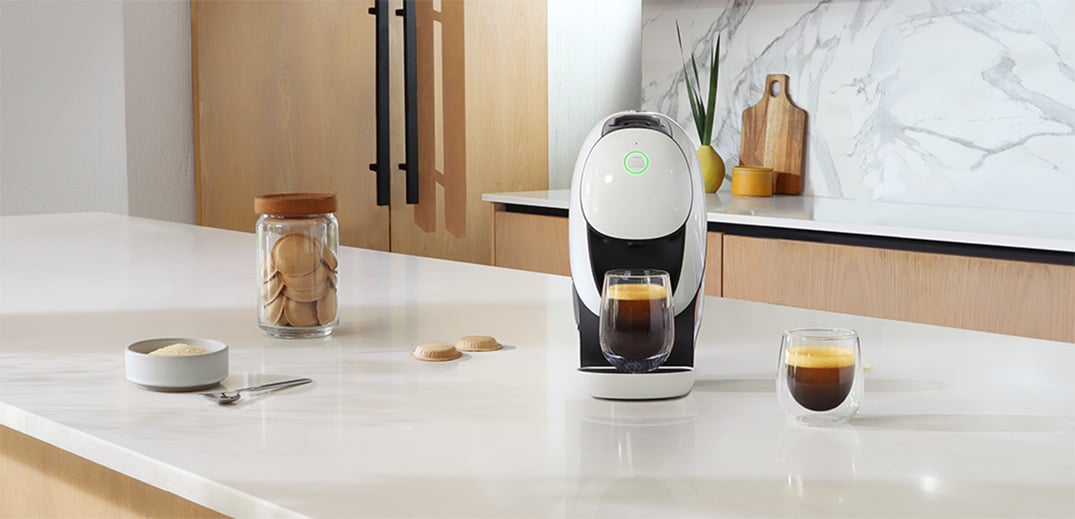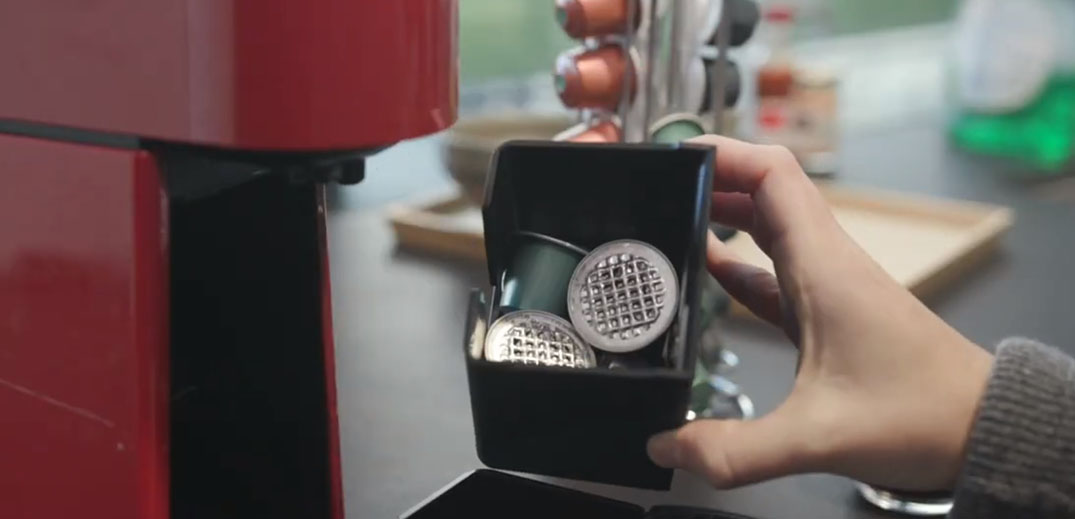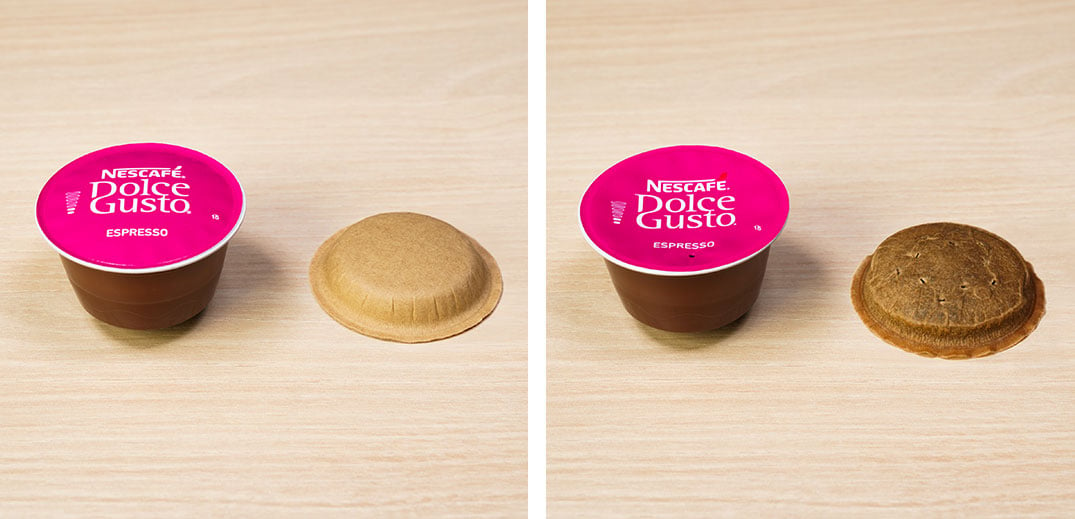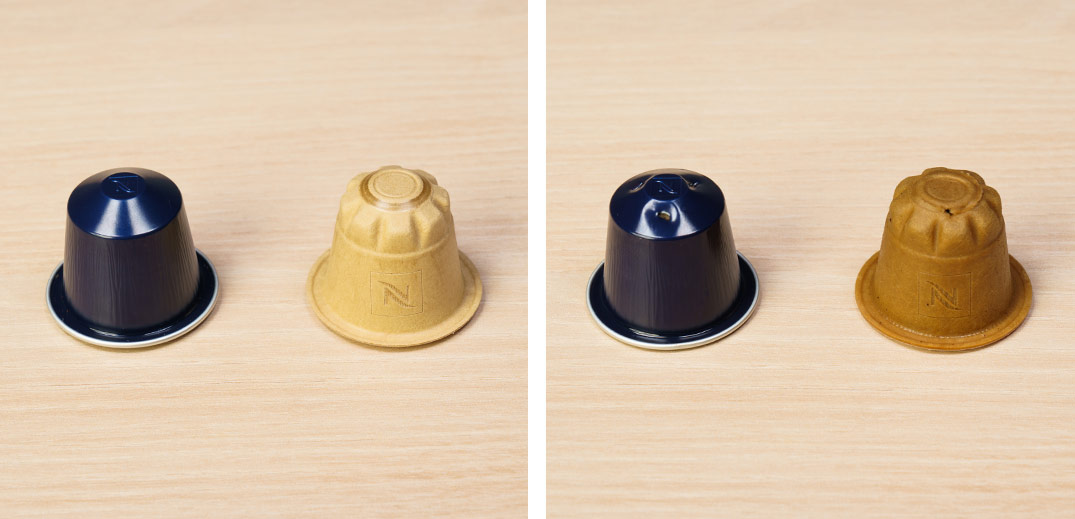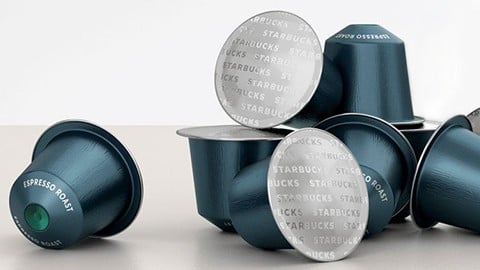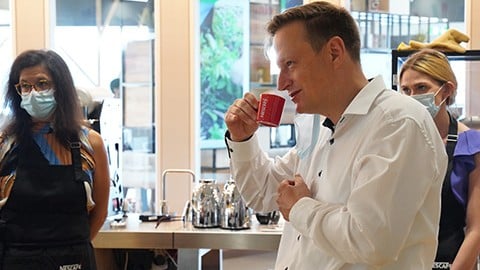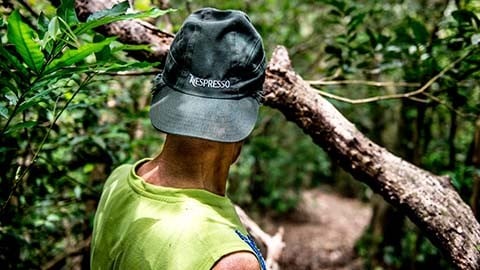Circular solutions for coffee capsules
For more than 30 years, Nestlé has been at the forefront of offering coffee packaged in capsules that ensure quality and freshness, delivered through machines that use a precise amount of water and energy for each cup.
We are committed to giving all of our coffee capsules a second life after use. This requires a range of solutions including working towards packing circularity, piloting and scaling new materials, like compostable paper-based and technologies, as well as investing in well-functioning sorting and recycling/composting infrastructure.
The coffee capsule plays a key role in ensuring a very precise amount of coffee is used to brew a cup of coffee. This enables us to use precious resources in an efficient way and helps to minimise the carbon footprint with consistent in-cup results, time after time.
How do we know this? We analyse the environmental impact of our precision consumption coffee offering. In peer-reviewed life cycle assessments (LCA) conducted by Quantis ('LCA of a lungo cup of coffee made from a Nespresso Original capsule compared with other coffee systems in France' 2021/2022), it was concluded that a coffee brewed with a Nespresso, using an aluminium or compostable paper-based capsule, has a similar carbon footprint to other brewing methods such as drip filter and moka coffee systems. It also found that a full automat system had a 30% higher carbon footprint than the other systems.


Making our packaging more circular
We continue to increase the usage of recycled plastic and aluminum. We believe technology will only continue to evolve, and we will continue to evolve our approaches to using existing material.
In 2020 Nespresso launched coffee capsules using 80% recycled aluminum. This is part of the company's continued journey towards circularity, going further to minimize waste and maximize reuse of product materials.
Nescafé Dolce Gusto is constantly improving the design of its packaging to use less virgin plastic where it is possible, aiming to reduce its virgin plastic usage by 1 third by 2025. Already this year, as of March 2023, Nescafé Dolce Gusto will have reduced the amount of polypropylene in all capsules by 13%, resulting in saving around 8200 tons of plastic since 2018.
Investing in well-functioning sorting and recycling infrastructure
Both recycling and composting streams will play an important part in achieving a circular economy for our coffee capsules. Creating scaled and effective infrastructure takes time, investment, expertise, innovation, and importantly, collaboration.
Since 2014, Nestlé has invested more than 300 million CHF in recycling infrastructure across the world for its coffee capsule products, to give value to material that might otherwise have been wasted or lost. While there is more progress to come, recycling rates continue to rise and effective recycling remains a fundamental part of the solution to tackling packaging waste.
Example of recycling and composting projects across Europe
-
Belgium We collaborated with other coffee brands and aluminium packaging producers to enable the recycling of Nestlé coffee capsules via the Plastic, Metal and Drinks (PMD) blue bag as from January 2023 onwards. Similar projects have also taken place across Europe including in France, Germany and Spain.Read more
-
France Nespresso, Nestlé and JDE Peet's formed the Alliance for the Recycling of Aluminium Capsules in 2019, with the bold intention of recycling all aluminium coffee capsules in France. Through the alliance, we were able to equip 51 recycling centres across France with specialist machines to recycle aluminium capsules. The public recycling scheme ('the yellow bin'), can now be used by 30 million people in France to recycle aluminium capsules. Globally, 88% of Nespresso Club Members have access to a Nespresso dedicated recycling solution for capsules close to their home.Read more
-
France Our paper-based roast and ground coffee pods/capsules are certified OK compost HOME and OK compost INDUSTRIAL based on TUV Austria certification programme which refers to NF T 51-800, respectively EN 13432 standards, and are already accepted in the public bio waste bins in France. In France we initiated Union des Acteurs du Compostable (UAC), an interest organization gathering public authorities, companies, recycling operators, NGOs etc. with the main goal to collectively act in order to implement solutions, actions and concrete tools to help producers of biowaste increase the sorting of biowaste and raise awareness amongst consumer.Read more
-
Spain Nestlé Spain, Nespresso Division, created COAALI with JDE, Codorniu, Hydro, Cofresco and Bel in 2020. Pioneering a foucault machine and a magnet in the fines line, to effectively sort small-sized aluminium and steel products.Read more (pdf, 6Mb)
ARPP, founded by Nescafé Dolce Gusto, invested in the installation of a sorting robot using Artificial Intelligence and Deep Learning technology to sort small plastics items from the fines stream.
The Spanish Government included these initiatives as best practices in the Circular Economy Catalogue.
-
United Kingdom Podback is a nationwide, not-for-profit coffee pod recycling service in the United Kingdom. Created by the biggest names in coffee pod systems, Nespresso, Nescafe Dolce Gusto and Tassimo, to give people easy ways to recycle their pods.Read more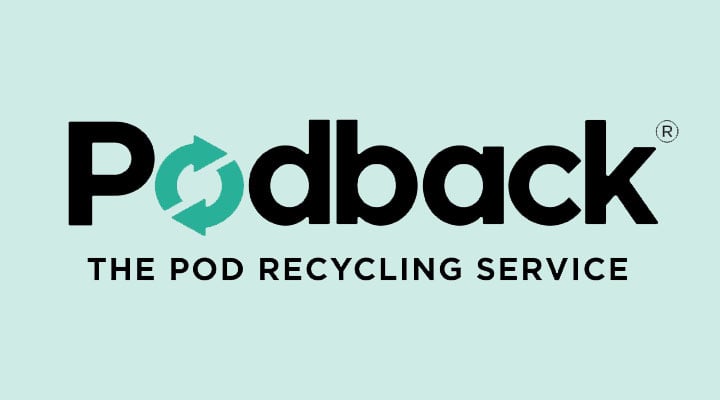
-
Germany Thanks to the German Circular Economy Act (Kreislaufwirtschaftsgesetz), the Green Dot organization together with the coffee industry have established a functioning recycling system for used coffee capsules in Germany. This allows for consumers to easily dispose of their used capsules together with other plastic and metal packaging in the yellow bag/bin. After that the capsules are being sorted and recycled.Read more
Nestlé coffee capsules recycling infrastructure overview
| Country | Dedicated system for capsules | Public system for capsules | ||
| Aluminum | Plastic | Aluminum | Plastic | |
| Austria | Yes | Yes | ||
| Belgium | Yes | Yes | Yes | |
| Bulgaria | Yes | |||
| Croatia | Yes | |||
| Cyprus | Yes | |||
| Czech Republic | Yes | Yes* | Yes* | Yes |
| Denmark | Yes | Yes | ||
| Estonia | Yes | |||
| Finland | Yes | |||
| France | Yes | Yes | Yes* | |
| Germany | Yes | Yes | ||
| Greece | Yes | |||
| Hungary | Yes | |||
| Ireland | Yes | |||
| Italy | Yes | Yes* | Yes* | |
| Latvia | Yes | |||
| Liechtenstein | Yes | |||
| Lithuania | Yes | |||
| Luxemburg | Yes | |||
| Malta | Yes | |||
| Monaco | Yes | |||
| Netherlands | Yes | Yes* | ||
| Norway | Yes | Yes | ||
| Poland | Yes | |||
| Portugal | Yes | Yes* | ||
| Romania | Yes | |||
| San Marino | Yes | |||
| Slovakia | Yes | |||
| Spain | Yes | Yes* | Yes* | |
| Sweden | Yes | Yes | ||
| Switzerland | Yes | Yes | ||
| United Kingdom | Yes | Yes | Yes | |
* In certain regions
Piloting new materials to scale and making positive impact in the future
We are not just working to evolve, strengthen, and redesign existing packaging solutions - we are also investing in new ones. Scaling new solutions takes time, so our approach is to test and learn and then to make informed decisions on the solutions we believe can make the biggest positive impact.
One of the best ways to make progress towards circularity and sustainability is through complementary solutions that provide consumers the choice of system most convenient and accessible to them. Both composting and recycling can be effective solutions. We are working to encourage local authorities to expand access to collective composting and the acceptance of paper-based coffee capsules in such schemes as well as helping consumers to find the closest composting solution. We hope to support and enable a general systemic change and harmonization in collective industrial composting, just as we are doing in aluminum and plastic recycling.
Recyclable plastic capsule and compostable paper-based pod before and after brewing. These single-serve units both look and feel different, and together with clear labelling this supports clear consumer guidance on where to dispose of them after use.
Last year, we announced two innovations in paper-based, compostable capsules, both certified for home and industrial composting by TÜV Austria, that are accepted in the public bio waste bins in some countries like France and Italy:
-
Nescafé Dolce Gusto Neo - Neo is Nescafé's next generation coffee machines and pods, that will be launched in France and Switzerland in September 2023. The pods are paper-based, certified home - and industrial compostable and use 70% less packaging (by weight) than current capsules. Watch Nescafé Dolce Gusto Neo presentation.
-
Nespresso paper-based capsules, certified for both home and industrial composting - these breakthrough paper-based certified home - and industrial compostable capsules offer another way to enjoy sustainably sourced high-quality coffee. This new range, for those who prefer to compost, will sit alongside existing Nespresso capsules. These new capsules are launching in France and later in the year in Switzerland. Discover more on how we developed a new range of home compostable capsules for Nespresso.
Recyclable aluminum and compostable paper-based capsules before and after brewing. These single-serve units both look and feel different, and together with clear labelling this supports clear consumer guidance on where to dispose of them after use.
Contributing to our Net Zero Roadmap for 2050
Our approach to make our precision-consumption coffee packaging more sustainable is an important part of Nestlé's five-pillar packaging sustainability strategy, which will contribute to our overarching goal of reaching net zero emissions by 2050.
When it comes to our capsules, the last drop doesn't mean the last use!
From increasing the circularity of packaging materials and coffee machines to piloting and scaling new innovations, to investing in well-functioning sorting and recycling infrastructure as well as reducing the need for virgin materials for our coffee capsules - these solutions are all part of our approach to making our precision-consumption coffee packaging more sustainable and give a second life to our capsules.
Find out more
Read more about the sustainability efforts undertaken by our coffee capsule brands:



